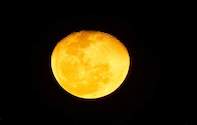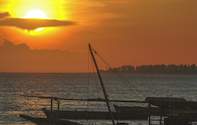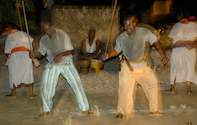
The new moon, if it puts in an appearance tonight, will mean the end of a long hard month of fasting for Zanzibar's predominantly Muslim population. During daylight hours in the lunar month of Ramadan the faithful may not eat, drink, smoke - or have sex. Only the sick, young children and travellers are exempt.
In temperatures that rise to over 90 degrees Fahrenheit in the wavy heat of the afternoons, giving up food and water is no token gesture. From tonight, though, an exhausting twenty-eight days of abstinence is up and the party can begin. Or can it?
If the new moon we're all waiting for chooses to show her face in the blue-black darkness above us, the celebrations for which planning is already well under way will commence first thing in the morning.
Electricity poles are being strung up around fields, girls and women have been pounding red henna leaves and black picco to paint their hands and feet for days now, and every store in town has been full to bursting with last-minute shoppers stocking up on bottles of orange Fanta, cuts of meat, bags of Ugali and starched nylon frocks. The children are worked up to the point of hysteria and the atmosphere of suppressed excitement and anticipation crackles in the hot air.

No moon, however, means that everyone must wait another 24 hours before breaking their fast. Such an important event cannot be left to chance - so not only is everyone on Zanzibar scanning the skies for their own moon, but we're all gathered eagerly around the nearest radio, waiting for the government to announce a new moon sighting above any part of Tanzania or coastal Kenya.
This is the ancient kingdom of the Swahilis, whose modern-day inhabitants still retain the faith brought here by the Arabic races whose fast-sailing dhows once controlled the East African coast and its lucrative slave trade.
As the night wears on it becomes apparent that no moon is to be forthcoming, in Zanzibar or anywhere else. Anticlimax prevails, and another hot, thirsty day goes by before the longed-for sickle appears on cue above the lights of Blues restaurant in the harbour and a cheer goes up from the ragged groups of watchers along the water's edge.
For the next five days and nights, it's time for a party that promises to put the tourists' Millennium celebrations of a week ago firmly in the shade. 'Dancing tonight' says my friend Hisdori mysteriously to me at lunchtime. 'Beer tonight' says his mother, usually the picture of demure matronhood in her kanga and headscarf, but today with a gleam in her eye and freshly painted henna on the palms of her hands.
For most of the year Dole is nothing more than a rather greasy looking patch of ground next to the road which runs to the spice plantation at Kizimbani. Tonight, however, it is lit up with an eerie whitish glow from the dozens of hurricane lamps hanging off the stalls selling tiny packets of cassava chips, plastic hair decorations and big thermos buckets full of dark purple tamarind juice.
Kids run in circles playing obscure games, or dance with their siblings to the muted beat of the disco. As twilight becomes night, a procession of tiny inert bodies - draped over the handlebars of their mothers' bicycles, or sitting asleep bolt upright at the front of their fathers' motorbikes - begin to leave the party.
Even preparing to go to Dole is an exhausting process - it takes all day and involves plaiting hair, painting henna and climbing gingerly into stiff nylon party dresses that crackle with static electricity. Little boys don't escape, stepping cautiously around in a variety of outfits and styles, from shiny three piece suits à la Bugsy Malone to full English football strips, complete with socks.
Some boys go the whole hog, dressing up as little girls in a sort of African 'trick or treat'. Adorned in kangas, with rags stuffed under their skirts for maximum wiggle and scarlet cochineal smeared on pouting lips, they proceed from house to house to drum and dance in return for cake and sweet lemongrass tea.
Now, however, the children glow in the dark like fireflies as they plod up the road behind their parents, drooping with fatigue. Most have had their finery captured for posterity in the tents set up around the periphery of the party by professional photographers, who bustle around arranging family groups like football teams.
Tonight is the last night of the celebrations, and as the children leave the party turns from school fete to rave. Teenagers and twenty somethings are now bounding wildly around to tunes that become increasingly bombastic.

Pushing aside the curtain onto the dance floor proper, the noise hits me like a wave as a perspiring DJ plays gangsta rap at top volume and a mass of sweating, pop-eyed lads bound around in Kangol hats and Nike t-shirts. I spot Hisdori and the gang at the far side of the field, trying to outdo each other in extravagant imitations of Tupac and Puff Daddy.
There's Ali, normally tall, skinny and lugubrious, but tonight waving his spindly arms above his head and grinning insanely. He's accompanied by Small Brother Of Ali, just as skinny but at 14 not quite as lugubrious or as tall. Iddi, forever Mr Cool, all chin beard and mirror shades, has is own shadow in Small Brother Of Iddi, exuding adolescent attitude also but not quite old enough for the beard.
Seeing me they grab my arms and try to make me dance, but it quickly becomes apparent as I try and fail to match their rhythm that I am the quintessential white person on the dance floor, so I settle for a seat on the sidelines and reflect on the fact that the angry lyrics they're dancing to could have been written by descendants of the very slaves who once huddled in the caves below the harbour in Zanzibar town, waiting to embark for the New World.
No trace of this irony, though, shows on the happy features that are glowing in the light of the hurricane lamps and shouting greetings to passers by without breaking their rhythm.
Just as the music and the dancing reach a sweating fever pitch, the DJ announces a Tarab tune. Tarab is the music of Zanzibar - a wailing vocal over a beat that is curiously Arabic and African at the same time, and traditionally only danced by females.
The lads on the dancefloor converge on the hapless man, shouting and waving their fists in outrage whilst still moving compulsively to the beat. The MC is unmoved, breaking into English to emphasise his point. 'Ladies only pleeease... LADIES ONLY!' The ladies appear, shyly at first but then with increasing confidence as the beat picks up.
A stately conga formation begins to wind its way around the dance floor, the girls' eyes, covered in picco and rendered drooping and sloe-like by infusions of nutmeg juice, glinting under their demure headscarves. The ladies hold up thousand-shilling notes above their heads as they sway along together, a symbol of their families' wealth and prestige.
The boys, however, are not to be dismissed that easily. They take to the floor, t-shirts draped over their heads to imitate the girls' kangas, Rizla packets held aloft in place of money, wiggling their rears and rolling their eyes as their conga picks up a giggling victim and tries to hustle her off the dance floor.
Helpless with laughter, I'm rolling around the floor when I feel a little hand tugging at mine and a 12 year old voice whispering 'Dance, lady, dance!'. I look up at his face, and recognise Hisdori's cousin, one of the mini drag queens from the village this morning. Who am I to refuse?
Copyright © Gemma Pitcher 2004

 Zanzibar is actually the name given to a cluster of islands that nestle in the waters of the Indian Ocean just off the coast of mainland Tan...
Zanzibar is actually the name given to a cluster of islands that nestle in the waters of the Indian Ocean just off the coast of mainland Tan...